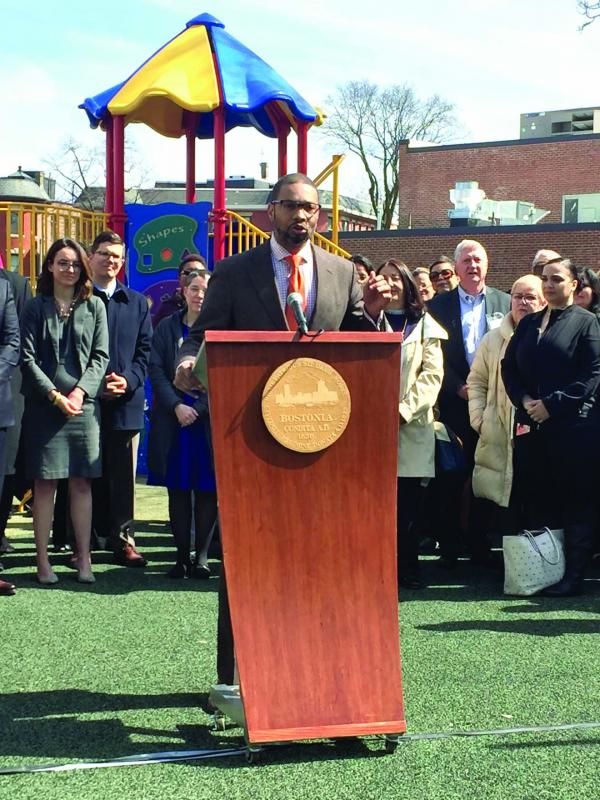April 3, 2019

Boston’s former education chief Rahn Dorsey spoke outside the ABCD Walnut Grove Head Start in Dorchester on Tuesday during an event to announce Mayor Walsh’s plan for a “Quality Pre-K Fund.” Daniel Sheehan photo
Delivering on what he called one of the cornerstones of his mayoral campaign, Mayor Martin Walsh announced on Tuesday the creation of a “Quality Pre-K Fund” that will make universal, high-quality pre-kindergarten education a guarantee for all four year olds in Boston within the next five years.
The mayor’s FY20 budget will include $15 million for the new fund, an investment that will help create 750 seats in the city’s “mixed delivery” pre-K programs that are operated collaboratively by BPS and community-based organizations like ABCD Head Start, Boys and Girls Clubs, and YMCAs.
The creation of those seats will close the gap that began at 1,500 seats when Walsh took office in 2014, and has been cut in half since then.
“We need to make sure that Boston is a place where every young person can succeed from the start,” said Walsh in speaking to a crowd of public officials, educators, and parents gathered at ABCD Walnut Grove Head Start in Dorchester while kids played in the background. “We need to make sure that this access to pre-kindergarten is a guarantee for every single family in Boston, regardless of your income or background.”
Walsh went on to call the advent of universal pre-K “a game changer,” alluding to news reports that surfaced in January about how BPS valedictorians have struggled after high school graduation.
“This is a component that changes that. Investment on the front end will give young people success on the back end,” the mayor said.
One element in the initiative that city officials say sets Boston’s pre-K model apart from others is its emphasis on “high quality” education, one based on BPS K1, an early education curriculum that incorporates play and tangible learning and has become a national model due to its success.
Notably, the system calls for a 2-to-20 teacher-to-student ratio in the classroom while ensuring that all pre-K educators have degrees in early childhood education and are paid the same as BPS teachers. Walsh emphasized that while there are currently enough seats for four year olds in the city’s pre-K programs, not all meet those “high quality” standards.
BPS interim superintendent Laura Perille noted that it was fitting that the mayor made the announcement on World Autism Day; she described the expansion of the inclusive Pre-K structure as “truly groundbreaking.”
She added: “One of the reasons that Boston has such a successful pre-K model is that all of our classrooms are inclusive, which means that students of all background and abilities are learning together side by side, making connections, playing and learning from one another at a very young age. It is our mission to meet students where they are, regardless of whether they have any type of disability, whether they are English learners new to this country, whether their families are struggling with poverty or face other kinds of obstacles.”
John Drew, president and CEO of ABCD, was on hand for the celebration. “I have been waiting for this day for a long time,” he told the crowd. He noted that much of his work in his 50 years of nonprofit advocacy has been about putting kids from all walks of life on a level playing field.
“A lot of times they start 50 yards behind the starting line. For me, a victory is at the finish line, be that first grade or whatever. They are right there at the finish line, tied or winning.”
Former city education chief Rahn Dorsey said he views the announcement as “a shift for Boston to a more holistic view of education. This is really about making an investment in perhaps the surest bet you can make in education, and that is in early education and in children.”
Skill gaps in children can emerge as early as two years old, he added while stressing the importance of placing young ones in an educational environment as early as possible. “BPS K1 has proven to be the closest thing we have to an inoculation against lost opportunity and backsliding from an educational standpoint.”
Dorsey concluded his remarks with a familiar refrain that has become an unofficial motto of sorts with regard to the push to close opportunity gaps in BPS: “We need to make sure that all doors are the same door to opportunity.”


